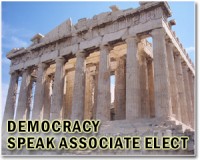| . |  |
. |
Washington (AFP) Oct 17, 2010 Facebook page? Check. Twitter feed? Check. YouTube channel? Check. Since Barack Obama rode the Web to the White House two years ago, a digital toolkit has become an essential item in the campaign arsenal of nearly every US office-seeker. With the November 2 mid-term elections just weeks away, candidates across the country are reaching out virtually to their constituents in a bid to drum up votes. "Facebook and social media in general have been adopted by all politicians who are looking to get an edge," said Andrew Rasiej, the co-founder of techPresident.com, a blog that tracks the use of technology in politics. "All the associated benefits of social media, including being able to target, raise money and get out the vote, are being looked to as the new battleground," Rasiej said. "Social media tools have changed from being new and exotic to being a standard part of campaigns," agreed Colin Delany, founder and chief editor of Epolitics.com, a site that focuses on online politics and advocacy. A starting point for a 21st century online campaign is a website. "A website's a given," Rasiej said. "But it's no longer about having people visit your website, although that's important. "It's about being present where people already are, being present in the networks where people are already congregated. "A website is sort of like a campaign office and social media is the town hall. You're going to be heard a lot more if you go to the town hall than if you just put posters in your storefront." That town hall for many candidates is Facebook and its 500 million members. "Facebook is the key," said John Culberson, a Republican from Texas who is considered one of the most tech-savvy members of the House of Representatives. "As Facebook becomes more powerful and more adroit in the future it is going to become a pivot point," Culberson, who has nearly 4,000 friends on Facebook, told AFP. Culberson has far more followers on Twitter -- over 13,500 for his @johnculberson account -- but he has soured on the microblogging service. "I quit Twitter," he said. "Too many mindless trolls and spammers." Rasiej said key ingredients for an online campaign are a "robust Facebook profile that's updated regularly," a YouTube presence to "tell stories about the rationale for your candidacy" and an "authentic Twitter account." "That means not having a staffer tweet for you but actually tweeting yourself," he said. "People who use social media know the difference between a real voice and a fabricated voice." Nancy Scola, the associate editor of techPresident, said the tools being used during the current campaign are largely the same as those successfully employed by Obama two years ago. "We're not seeing too much innovation this mid-term cycle," Scola said. "There's no President Obama of the mid-terms." But Scola and the other online political observers said candidates are using targeted Google search advertising more than ever before. "You're starting to see the techniques of e-commerce be applied to e-politics," Rasiej said. "Google and Facebook advertising have become standard tools since they're particularly useful for congressional and state races because they're easy to target," Delany said. "This means that a campaign doesn't waste money advertising to people outside their districts, and it also lets them hit particular demographics with targeted messages intended to resonate." Email also remains a "crucial political application," said Delany. "Email typically has a much higher response rate for any given message than Facebook or Twitter, and it also reaches more people, since most Americans have an email account but fewer are on Facebook," he said. Rasiej said the Republican Party, which was outdueled by the Democratic Party on the Web last time around, has made huge strides online over the past two years and "surprisingly, are ahead of the Democrats in most regards." Culberson, the Republican congressman from Texas, however, expressed frustration with the current technology. "I wish somebody would come up with a piece of social software that would allow a cloud of constituents to follow me in real-time and keep up with what I'm doing," he said. "We'll get there," he added. "I'm confident somebody's going to develop an app."
Share This Article With Planet Earth
Related Links Democracy in the 21st century at TerraDaily.com
 Top Obama ally, Tea Party upstart in debate clash
Top Obama ally, Tea Party upstart in debate clashLas Vegas, Nevada (AFP) Oct 14, 2010 President Barack Obama's top Senate ally and his upstart Tea Party-backed challenger went head-to-head in a crunch debate Thursday, less than three weeks before voters here decide their fate. After weeks of lobbing rhetorical bombs at each other in campaign speeches and advertisements, Democratic Senate Majority Leader Harry Reid and Republican rival Sharron Angle locked horns in a one-off t ... read more |
|
| The content herein, unless otherwise known to be public domain, are Copyright 1995-2010 - SpaceDaily. AFP and UPI Wire Stories are copyright Agence France-Presse and United Press International. ESA Portal Reports are copyright European Space Agency. All NASA sourced material is public domain. Additional copyrights may apply in whole or part to other bona fide parties. Advertising does not imply endorsement,agreement or approval of any opinions, statements or information provided by SpaceDaily on any Web page published or hosted by SpaceDaily. Privacy Statement |